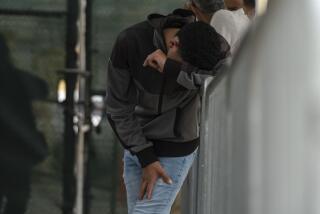350 GIs Arrive to Bolster Kuwait : Deployment: They are the first of more than 1,000 who will move north as a show of force against any Iraqi threat.
KUWAIT CITY — The first of more than 1,000 U.S. troops touched down on a wind-swept runway here Friday, preparing to move north into the desert as a new show of allied force against any threats from Iraq.
Senior Kuwaiti military commanders greeted the first 350 troops from the Army’s 1st Cavalry Division, based at Ft. Hood, Tex., as they debarked from a chartered jumbo jet and prepared to pick up tanks, armored personnel carriers and artillery positioned at a military camp on the Kuwaiti coast.
The battalion-size task force, scheduled to conduct military exercises about 25 miles south of the Iraqi border, was just part of the latest American pressure against Iraqi President Saddam Hussein.
His continued defiance of U.N. authority after the Persian Gulf War prompted an allied air strike in southern Iraq earlier this week and further warnings Friday from President Bush.
U.N. officials said it appeared that Iraq still has not moved to shut down six disputed police posts in the Kuwaiti part of a nine-mile-wide demilitarized zone along the Kuwait-Iraq border. The United Nations had ordered the posts removed by midnight Friday.
Kuwaiti officials have also sought the removal of nine more police posts located in the Iraqi part of the demilitarized zone.
Western officials have not ruled out the possibility of renewed military action if the posts remain after Friday’s deadline. “We’re not ruling it in, and we’re not ruling it out,” said one Western source in the Kuwaiti capital.
Officials here said the new American forces in Kuwait could be called on to help shut down the posts, but only under the auspices of the U.N. Iraq-Kuwait Observer Mission patrolling the tense border zone between Iraq and Kuwait.
“Our last information is that the posts are still there. Today was the deadline for removing them,” said Abdelatif Kabbaj, a spokesman for the U.N. agency.
The posts, mostly small prefabricated buildings and tents near the border towns of Safwan and Umm Qasr, are staffed by Iraqi security forces armed with pistols, and some are located near similar Kuwaiti security posts.
A Kuwaiti police officer was killed and two others were injured last August when a firefight broke out at one of the posts.
Iraq has linked the posts’ removal to compensation for Iraqi farmers displaced by a newly demarcated border line between Iraq and Kuwait.
Kuwaiti Information Minister Saud al Sabah said Friday that Kuwait is prepared to pay such compensation, but not in exchange for removing the police posts, which Kuwait regards as a separate issue. “This is a question of sovereignty,” he said. “You cannot have a foreign police force operating in Kuwaiti territory.”
Arriving American troops were to pick up pre-positioned U.S. military equipment at Camp Doha on the Kuwaiti coast, then move out into the Udayri range exercise area in the desert north of Kuwait city for maneuvers. They are joining about 300 American troops already in Kuwait on a previously scheduled military exercise known as Iris Gold.
Washington said the troops are here only to conduct exercises. But their presence is also a deterrent to further violations by Iraq of U.N. authority and Gulf War cease-fire agreements.
The troops also are intended to deter any Iraqi retaliation against Kuwait, which officials in Baghdad recently resumed describing as a territory of Iraq.
Kuwait, whose own forces have been placed on full alert, did specifically ask for the new American deployment but asked for “a U.S. show of support” in conjunction with the air strike, according to Western diplomats.
Wednesday’s air strike by American, British and French planes in southern Iraq followed a range of actions by Baghdad to flout U.N. authority, including several unauthorized incursions by hundreds of Iraqis into Kuwaiti territory to recover Iraqi materiel in advance of Friday’s deadline. Such forays had been authorized on a limited basis in the past, under direct U.N. supervision.
But Iraq began as early as Jan. 2 to send hundreds of men across the border without direct U.N. permission, including a mission just before the air strike in which four Chinese-made Silkworm missiles were recovered from former Iraqi military bunkers in Kuwaiti territory.
Iraq has also sought to recover pumping equipment from five to six oil wellheads in the Ritqa field on the Iraq-Kuwait border, a request that U.N. officials did not immediately grant, apparently because of fears that Iraq could damage the wells. Iraq set fire to hundreds of Kuwaiti oil wells in the wake of the Gulf War.
“We know what the Iraqis have done to oil wells, and there’s concern about what they may do again,” said one source familiar with the discussions.
More to Read
Sign up for Essential California
The most important California stories and recommendations in your inbox every morning.
You may occasionally receive promotional content from the Los Angeles Times.










